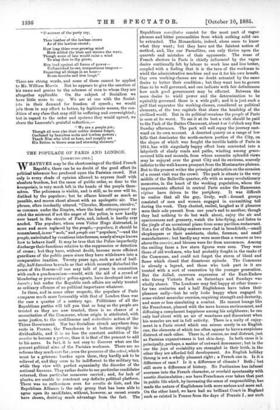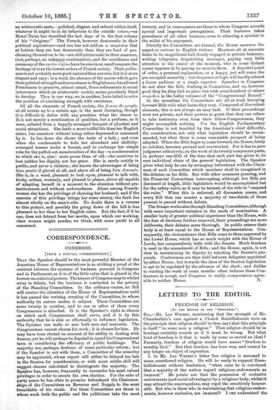THE POPULACE OF PARIS AND LONDON.
[COMMUNICATED.]
WHA.TEVER may be the shortcomings of the third French Republ;o, there can be no doubt of the good effect its political tolerance has produced upon the Parisian crowd. Not only is every shade of opinion allowed to express itself with absolute freedom, but the cause of public order, so dear to the bourgeoisie, is very much left in the hands of the people them- selves. The policeman is visible, and is still, as he ever will be, disliked by the populace; but he effaces himself as much as pomade, and moves about almost with an apologetic air. The phrase, often insolently uttered, " °ironies, Messieurs, circulez," so common under the Empire, when the least attrcrupement ex- cited the mistrust if not the anger of the police, is now hardly ever heard in the streets of Paris, and, indeed, is hardly ever needed. The populace, whom even Victor Hugo distrusted, is more and more replaced by the peuple,--populace, it should be remembered, is our "mob," and peup/e our "populace,"—and the peuple, anirritated by vexations interference, nearly always knows how to behave itself. It may be true that the Police imperfectly discharge their functions relative to the suppression or detection of crime ; but they have, without doubt, become more efficient guardians of the public peace since they have withdrawn into a comparative inaction. Twenty years ago, such an act of half- silly, half-ferocious bravado as that which recently disturbed the peace of the Bourse—if one may talk of peace in connection with such a pandemonium—would, with the aid of a crowd of blundering or provocative police-agents, have developed into an emeufe ; but under the Republic such affairs are safely treated as ordinary offences of no political importance whatever.
In these, and in some other respects, the populace of Paris compares much more favourably with that of London than was the case a quarter of a century ago. Politicians of all the Republican parties will tell you that so long as the people are trusted as they are now trusted, there is no chance of a resuscitation of the Commune, whose origin is attributed, with some justice, to the meddlesome and autoritaire action of the Thiers Government. Nor has Socialism struck anywhere deep roots in France; the Frenchman is at bottom strongly in- dividualistic, and it is no less the constant ambition of the ouvrier to become a patron, than it is that of the peasant to add to his acres. In fact, it is not easy to discover what are the present political aims of the Parisian workmen. There are no reforms they much care for ; even the pressure of the octroi, which must be a grievous burden upon them, they hardly ask to be relieved of, and they seem to be indifferent to the military tax, while they view with perfect equanimity the disorder of the national finances. They rather desire to see particular candidates returned, than particular measures carried ; and, for lack of planks, are unable to construct any definite political platform. There was no enthusiasm even for scrutin de Usk, and the Republican Alliance is the only group that has been able to agree upon its candidates, without, however, as recent events have shown, deriving much advantage from the fact. The Republican mantfeates consist for the most part of vague phrases and bitter personalities from which nothing solid can be extracted. The Monarchists, indeed, alone seem to know what they want ; but they have not the faintest notion of method, and, like our Parnellites, can only thrive upon the quarrels and mistakes of their opponents. The mass of French electors in Paris is chiefly influenced by the vague desire continually felt by labour to work less and live better, coupled with a feeling that it is the tarn of the workman to wield the administrative machine and use it for his own benefit. Oar own working-classes are no doubt actuated by the same desire to better their condition ; but they want less to govern than to be well governed, and can indicate with fair definiteness how such good government may be effected. Between the mere desire to wield power and the determination to be equitably governed there is a wide gulf; and it is just such a gulf that separates the working-classes, considered as political elements, of the two capitals that share the headship of the civilised world. But in its political reunions the peuple of Paris is seen at its worst. To see it at its best a visit should be paid to the Park of the Buttes Chaumont, about 4 or 5 o'clock any fine Sunday afternoon. The park will well repay the journey east- ward on its own account. A deserted quarry on a range of low hills that dominates the north-eastern portion of the City, on the slopes of which was fought the terrible battle of Paris in 1814, has with singularly happy effect been converted into a labyrinth of shady roads and paths, winding among grass- covered hills and mounds, from whose summits splendid views may be enjoyed over the great City and its environs, scarcely inferior to the well-known prospect from the Montmartre plateau. But to the present writer the principal attraction on the occasion of a recent visit was the crowd. The park is situate in the very middle of the Belleville quarter, rife with so many revolutionary memories, in the heart of the working population, whom the improvements effected in central Paris under the Hausmann regime have driven to the periphery. It was difficult to realise that all the gay, lively, well. dressed groups consisted of men and women engaged in unremitting toil daring the week. They chatted, smiled, laughed as if pleasure were their sole pursuit from one• year's end to another, though they had nothing to do but walk about, enjoy the air and spaciousness and greenery, watch the kite-flying, and listen to the jingle of an occasional piano from some pavilion-restaurant. Not a few of the holiday-makers were clad in broadcloth,—small shopkeepers or their assistants, clerks, foremen, and small manufacturers ; but hardly any were more than a remove or two above the ouvrier, and blouses were far from uncommon. Among the smiling faces a few stern figures were seen. They were those of old workmen, who had probably fought in the ranks of the Commune, and could not forget the storm of blood and flame which closed that disastrous episode. The Commune is already a legend, and those who took part in it are treated with a sort of veneration by the younger generation. But the dulled, careworn expression of the East-Enders who throng Victoria Park on Saturdays and Sundays was wholly absent. The Londoner may feel happy at other times— for two centuries and a half Englishmen have taken their pleasure sadly—but he only looks happy when engaged in some violent muscular exercise, requiring strength and dexterity, and more or less simulating a combat. He cannot lounge like the Frenchman, pleased with the mere human environment, and diffusing a complacent happiness among his neighbours; he can only loaf about with an air of weariness and discontent when his muscles are not in full activity. There is a unity of enjoy- ment in a Paris crowd which one misses sorely in an English one, the elements of which too often appear to have a suspicious distrust of each other. There is, of course, no real distrust, just as Parisian expansiveness is but skin-deep. In both cases it is principally, perhaps, a matter of outward demeanour; but in the one the joys of sociability are strangled in their birth, in the other they are afforded full development. An English holiday throng is not a wholly pleasant sight ; a French one is. Is it a
difference of race P Is it a difference of climate Both ;• but still more a difference of history. No Puritanism has infused sourness into the French character, or overlaid spontaneity with ascetic dissimulation ; nor have Frenchmen ever taken that part in public life which, by increasing the sense of responsibility, has made the nature of Englishmen both more serious and more sad. On the other hand, we have had no brilliant Court in England such as existed in France from the days of Francis I, nor such an aristocratic caste,—polished, elegant, and refined within itself, whatever it might be in its behaviour to the outside reture,—as Henri TaMe has described the last days of in the first volume of his " Origines." The French, however democratic in their political aspirations—and one has not seldom a suspicion that at bottom they are less democratic than they are fond of pro- claiming themselves to be—are still aristocratic in their manners, (not, perhaps, an unhappy combination), and the courtliness and ceremony of the anclen r4rime have become in no small measure the heritage of even the lowest orders of French society. Their polite- ness is not probably more good-natured than oar own, but it is more elegant and easy; in a word, the absence of the causes which gave their political strength and earnestness to Englishmen, has allowed Frenchmen to preserve, almost intact, those refinements in social intercourse which an aristocratic society seems peculiarly fitted to develop. They in one way, we in another, have failed to solve the problem of combining strength with sweetness.
Of all the elements of French society, the femme du peuple, at all events up to a certain age, is the most charming, though it is difficult to define with any precision what the charm is. It is not merely a combination of qualities, but a perfume, as it were, exhaled from a happily-arranged bouquet of physical and social attractions. She leads a more toilfal life than her English sister, but somehow without being either depressed or coarsened by it. In her dress she shows the taste of a lady ; and even when she condescends to hide her abundant and skilfully. arranged tresses under a bonnet, and to exchange her simple robe for the puffed-out monstrosities of the day—a condescension to which she is, alas ! more prone than of old—she contrives to lose neither her dignity nor her grace. She is rarely untidy in public, and never a slattern ; she knows the advantages of being kien garage if gloved at all, and above all of being bien ehaussee. She is, in a word, pleasant to look upon, pleasant to talk with, lively, artless, womanly, and pleased to please, above all capable of adapting herself in a moment to the situation without pre- tentiousness and without awkwardness. Alone among French- women she has the privilege of choosing her husband; and if the exercise of this privilege brings her some misery, the fault lies almost wholly on the man's side. No doubt there is a reverse to this picture, and possibly the going down of the hill is less pleasant to her than to her English sister. But the fact, if it be one, does not detract from her merits, upon which our working- class women might ponder, we think, with some profit to all concerned.



































 Previous page
Previous page